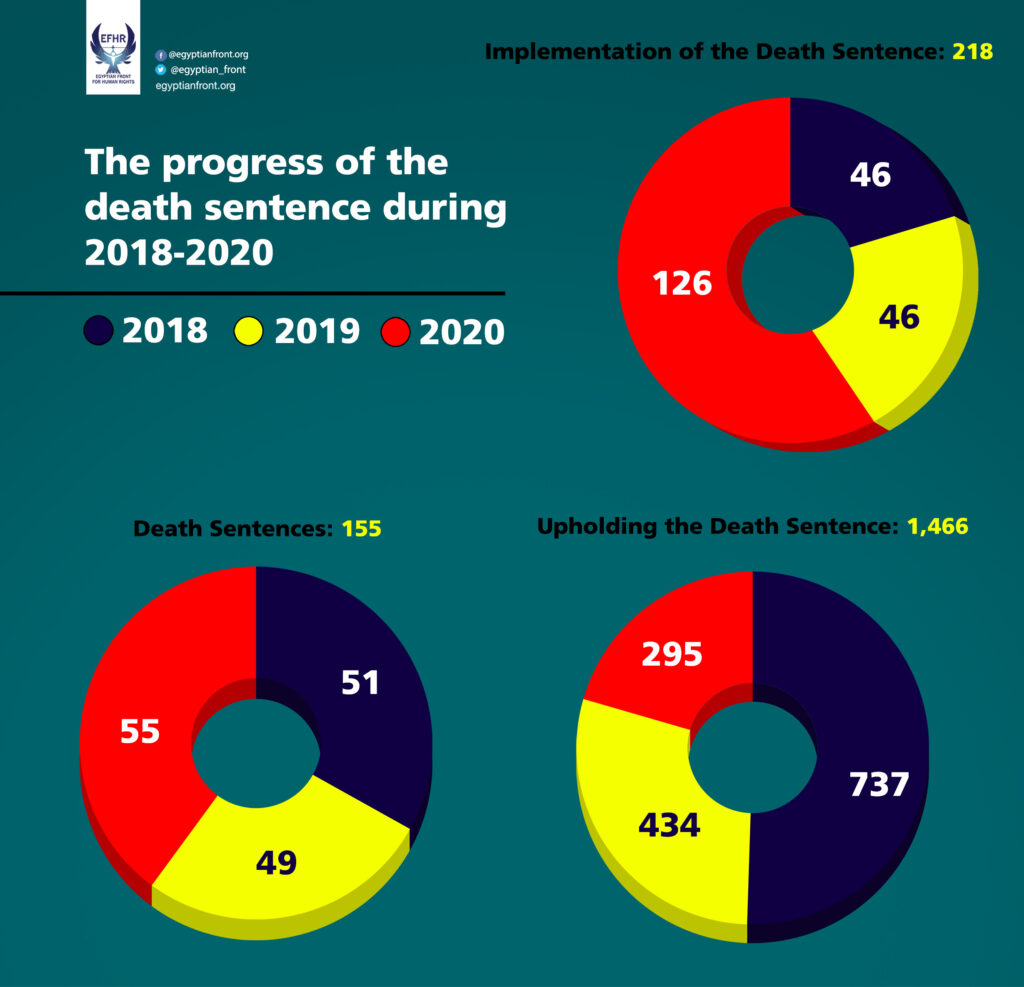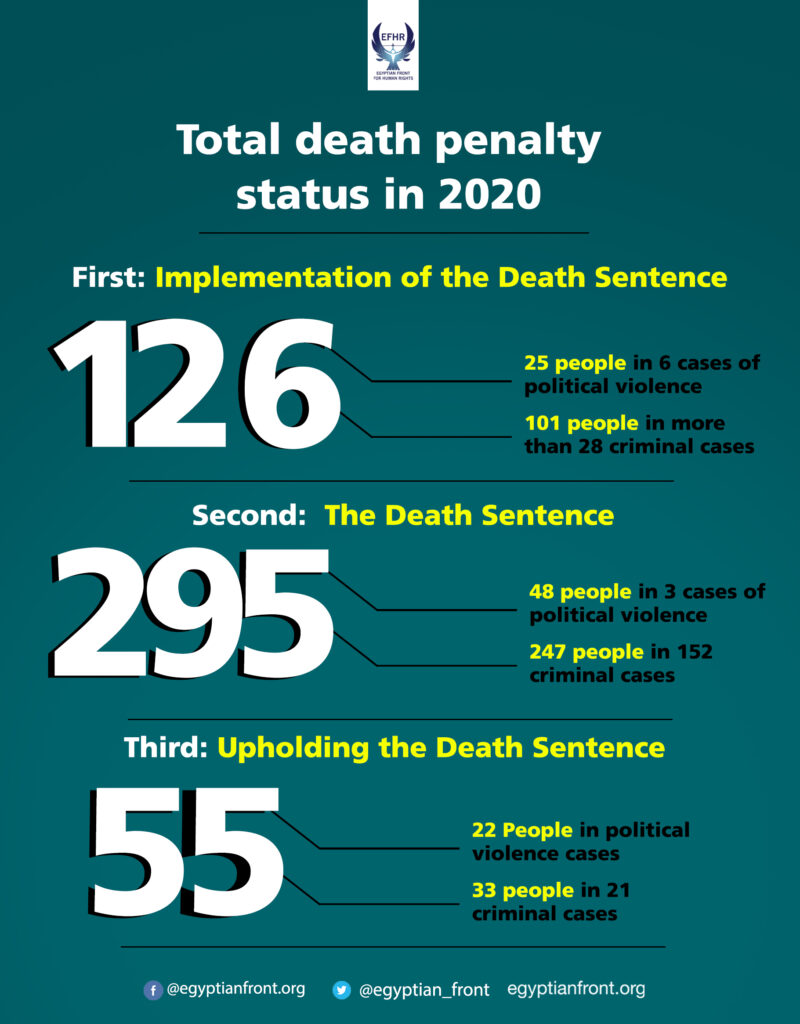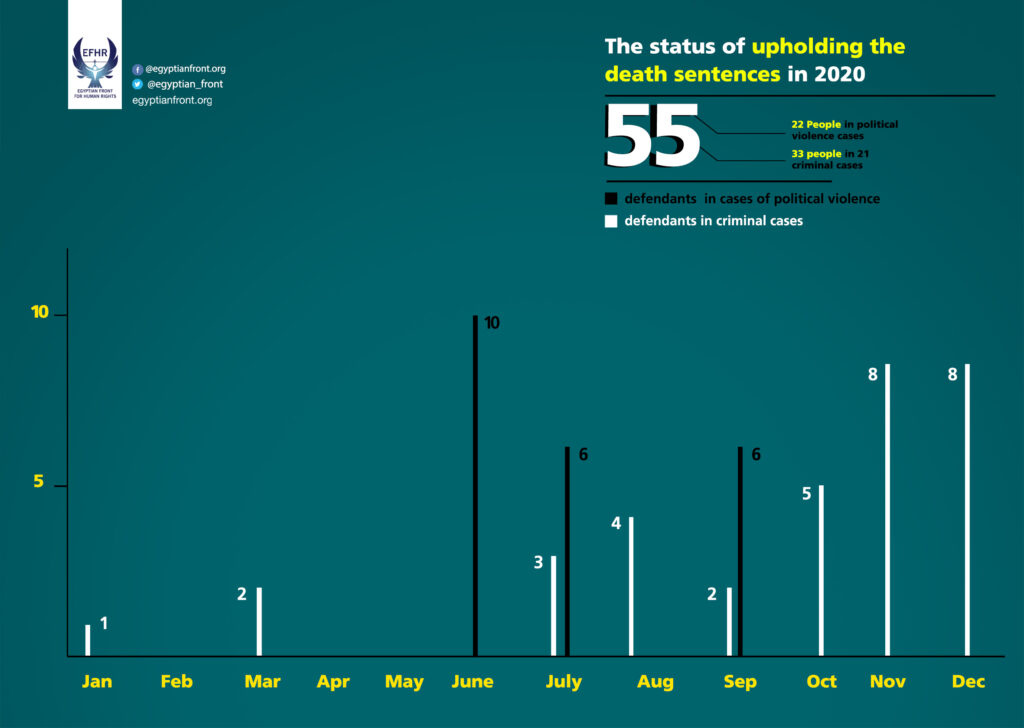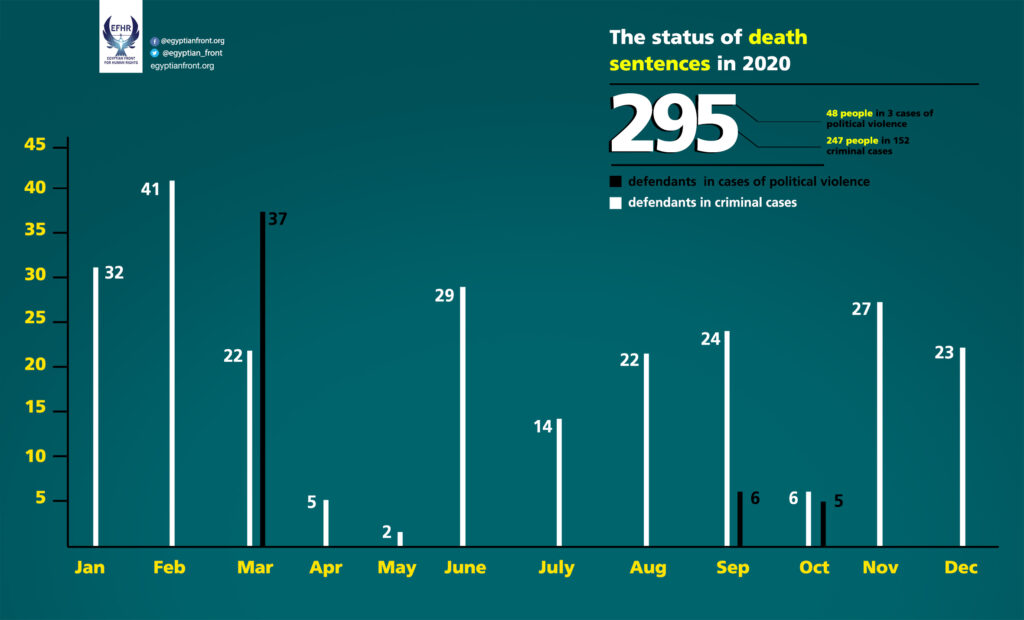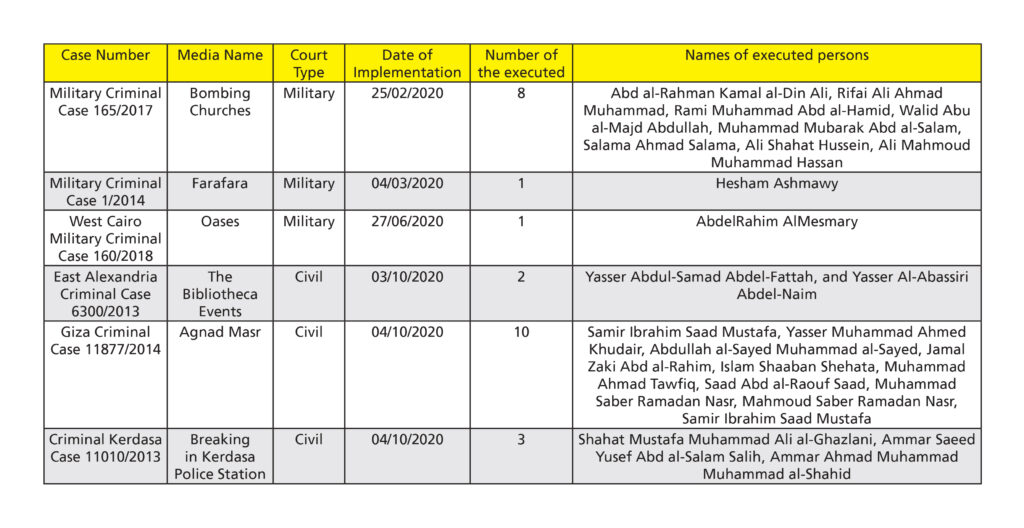To read the full report
During this year, the Egyptian judicial and executive authorities still progressively applied the death penalty; either through issuing, upholding or implementing dozens of verdicts ending lives, whether as a punishment for criminal offenses or terrorism crimes. The data collected by the Egyptian Front indicate that the trial process in death penalty cases was marred by flagrant breaches of fair trial guarantees according to international covenants, as well as breaches of the defendants ’rights protected in the Egyptian law and constitution.
The most prominent feature regarding the situation of the death penalty in Egypt in 2020 can be considered the sudden expansion in its implementation, especially over the months of October and November, during which the execution process affected at least 78 people in criminal cases and others involved in political violence, out of 126 people who were executed during the whole year. This is twice the number of death sentences during the previous two years, and one-third of the number of those executed since 2013, who have reached approximately 334 people. While 80 people are still awaiting execution at any moment as of the date of this writing.
The Egyptian Front for Human Rights observed a significant increase in the execution of death sentences during 2020, as at least 126 people were executed, compared to 46 people who were executed in 2019. While the death sentences witnessed a significant decrease with at least 295 death sentences being issued, compared to 434 during the previous year, while 55 people received enforceable verdicts confirming the death penalty against them.
Ledger Live: Navigating the crypto world securely. Discover Ledger Live’s features ensuring the safety of your assets for a worry-free experience.
Infographic showing the progress of the death sentence during 2018-2020
This escalation comes despite the domestic and international human rights condemnations for the Egyptian authorities’ expanding its application of the death penalty. The most recent of which being the decision of the European Parliament in December 2020, which condemned, in the context of its criticism of the deteriorating human rights situation in Egypt, the expansion of death sentences. These condmenations came about a year after Egypt received recommendations from 29 countries during the universal periodic review of the human rights file in Egypt in November 2019, most of which came within the framework of calls for a moratorium on executions and a mitigation of death sentences, as well as accession to the Second Optional Protocol to the International Covenant on Civil and Political Rights, which aims at abolishing the death penalty, especially in mass trials, to guarantee the right of the defendants to a fair trial, and to reduce the number of crimes punishable by death, as wel as to consider nullifying them from national legislation. In addition to that, the punishment should not be used against anyone who is under the age of 18 at the time of the crime. It is worth noting that the official narrative considers the calls for an end to the death penalty as an attempt to “keep the terrorists away from the gallows.”
The Egyptian Front believes that this expansion of the implementation of death sentences, especially in light of trials that lack the simplest standards of fair trial or respect for the rights of the defendants guaranteed by the constitution and international covenants, is an arbitrary use of the death penalty, and a disregard of the right to life. The Egyptian Front calls on the authorities to stop imposing the death penalty and start considering its abolition, and also to work on purging national legislation that include the death penalty for up to 105 crimes, reviewing all verdicts issued by it before that, and making sure that the defendants in these cases have access to all fair trial guarantees.
Total death penalty status in 2020
First: Implementation of the Death Sentence
The Egyptian authorities carried out death sentences against at least 126 people in 26 cases, most of whom were accused in criminal cases (101), compared to (25) who were accused in 6 cases for committing political violence.
The first execution in cases of political violence was against 8 people who were convicted by the court in the Military Criminal Case 165/2017, known in the media as the “bombing of churches” case, they were executed on February 25, 2020. On March 4, the execution of “Hisham Ashmawy” took place on grounds of the verdict in the Military Criminal Case 4/2014, known in the media as the “Farafra Ambush”. The execution was also carried out against “Abd al-Rahim al-Mismari” at the end of June, as he was sentenced in the West Cairo Military Criminal Case 160/2018 , known in the media as the “Oases” case.
The Egyptian Front for Human Rights had monitored through analyzing the official investigation papers in both the cases of the bombing of churches and the oases, where most of them have been subjected to widespread violations since their arrest, on top of which enforced disappearances for prolonged periods, physical and moral torture, denial of the right to defense, and reliance on anonymous investigations, as well as the verdicts being issued by exceptional military courts.
In the second half of 2020, the authorities carried out the death sentences against “Yasser Abdel Samad Abdel Fattah and Yasser Al Abassiri Abdel Naim” on the grounds of their sentences in the case known in the media as the “Bibliotheca Alexandrina” case. This was followed by the authorities’ execution of death sentences against “Samir Ibrahim Saad Mustafa – Yasser Muhammad Ahmed Khudair – Abdullah Al Sayyid Muhammad Al Sayyid – Jamal Zaki Abdel Rahim – Islam Shaaban Shehata – Muhammad Ahmed Tawfiq – Saad Abdel Raouf Saad – Muhammad Saber Ramadan Nasr – Mahmoud Saber Ramadan Nasr – Samir Ibrahim Saad Mustafa “in the case known in the media as the “Agnad Masr ”case, and both“ Shahat Mustafa Muhammad Ali Al-Ghazlani Ammar – Saeed Yusef Abd Al-Salam Salih Ammar-Ahmed Muhammad Muhammad Al-Shahid ”in the well-known case of “storming the Kerdasa Police Station ”. These cases also witnessed widespread violations against the defendants, whether during the arrest, investigation, or trial process, and which did not affect the courts ’decision to issue and uphold the death sentence or the authorities in their execution.
As the Egyptian Front emphasises on its principled and decisive position against terrorist operations, and does not assert the innocence or conviction of any of the defendants from the incidents attributed to them, the Egyptian Front believes that it is imperative for the authorities to ensure that all defendants obtain all trial guarantees, the importance of which is increasing in particular in cases containing incidents of political violence, so that these verdicts do not turn into some form of settling scores and retaliation against political opponents.
Infographics showing the status of implementing the death penalty in 2020
Second: Upholding the Death Sentences
The Courts of Cassation issued enforceable verdicts by upholding death sentences against 55 people in 26 cases, the majority of whom were accused in criminal cases (33), in addition to 22 other people accused in cases containing incidents of political violence.
The Court of Cassation had upheld the execution of three people accused in two criminal cases in the first quarter of the year. The verdict against 7 people was upheld in the case known in the media as “Helwan Police Department”. In July the death sentence was upheld for 9 people, including 6 accused in the “Ansar al-Sharia” and “ISIS Libya” cases, which were the cases that Egyptian Front has monitored. The analysis of the official investigation papers with the defendants have revealed their exposure to widespread human rights violations that followed their arrest, as well as violations of the most basic guarantees of a fair trial.
In August, Egyptian courts upheld the death sentence against 4 people in two criminal cases, and 8 people in two cases of political violence, including 6 people in a case of political violence, known in the media as the “Popular Resistance Committees of Kerdasa.” From October to the end of December, the Court of Cassation issued enforceable sentences to execute 21 people in 13 criminal cases. It is noteworthy that in June, the Supreme State Security Court had issued a verdict of executing 3 defendants in the case known in the media as the case of the “attempted assassinatation the Alexandria Security Director,” which is an irrevocable verdict that must be enforced once the military governor approves it.
Infographic showing the status of upholding the death sentences in 2020
Third: The Death Sentences
The Egyptian Front has monitored Egyptian courts issuing death sentences for at least 295 people in 155 cases, most of them in criminal cases (247), in addition to 48 verdicts issued in cases based on incidents of political violence.
The most prominent of these verdicts are the death sentences that were issued in March by the Cairo Criminal Court against 37 people in the “Ansar Bayt al-Maqdis” case, after a trial that was marred by a widespread breach of fair trial guarantees, as a large number of the defendants were subjected to enforced disappearance for long periods, and physical and moral coercion to make confessions as well as the denial of their right to defense.
In September, the Zagazig Criminal Court sentenced 6 people to death in the case of “the killing of policemen in Abu Kabir and Fakous”. In October, the Fayoum Criminal Court ruled against 5 people in the case of “storming the Mubarak Police Station” in Fayoum.
Infographic showing the status of death sentences in 2020
Attachments
Factsheet of the death penalty cases relating to terrorist incidents and political violence during 2020
1- Factsheet of cases relating political violence where the death penalty had been implemented within nine months of 2020
2- Factsheet of cases relating to incidents of political violence and upholding death sentences during 2020
3- Factsheet of cases relating to incidents of political violence where the death penalty was issued in 2020


